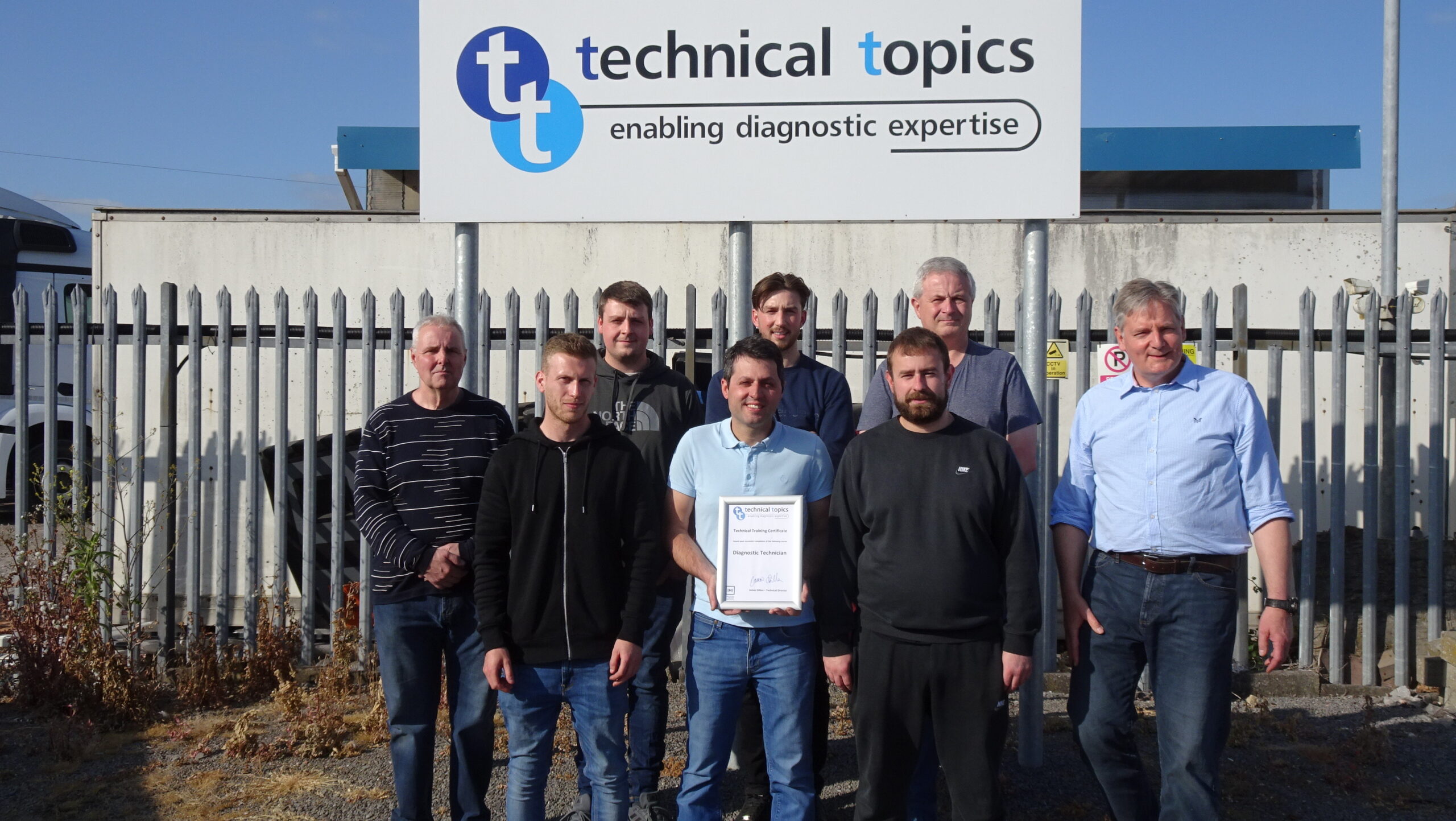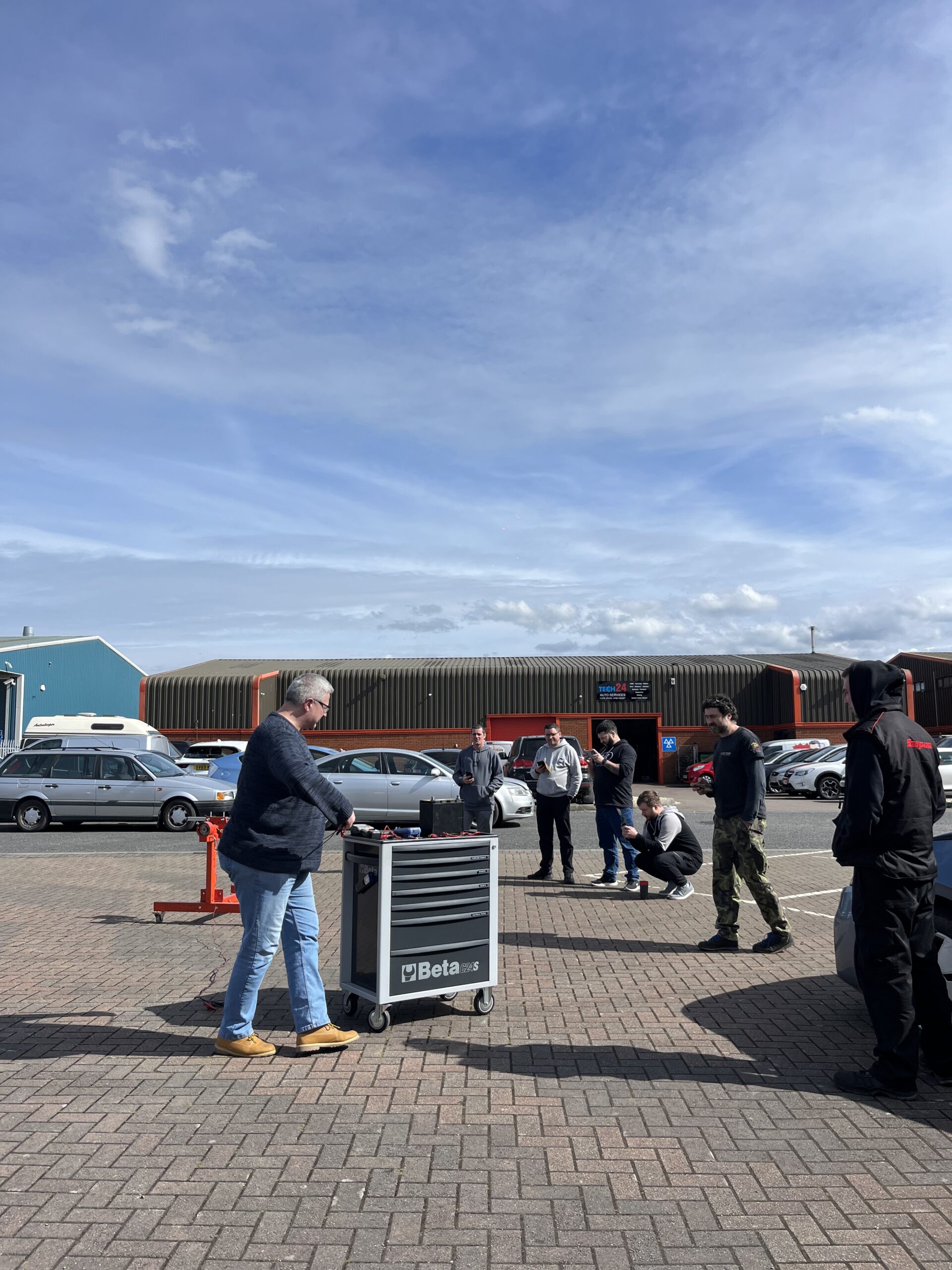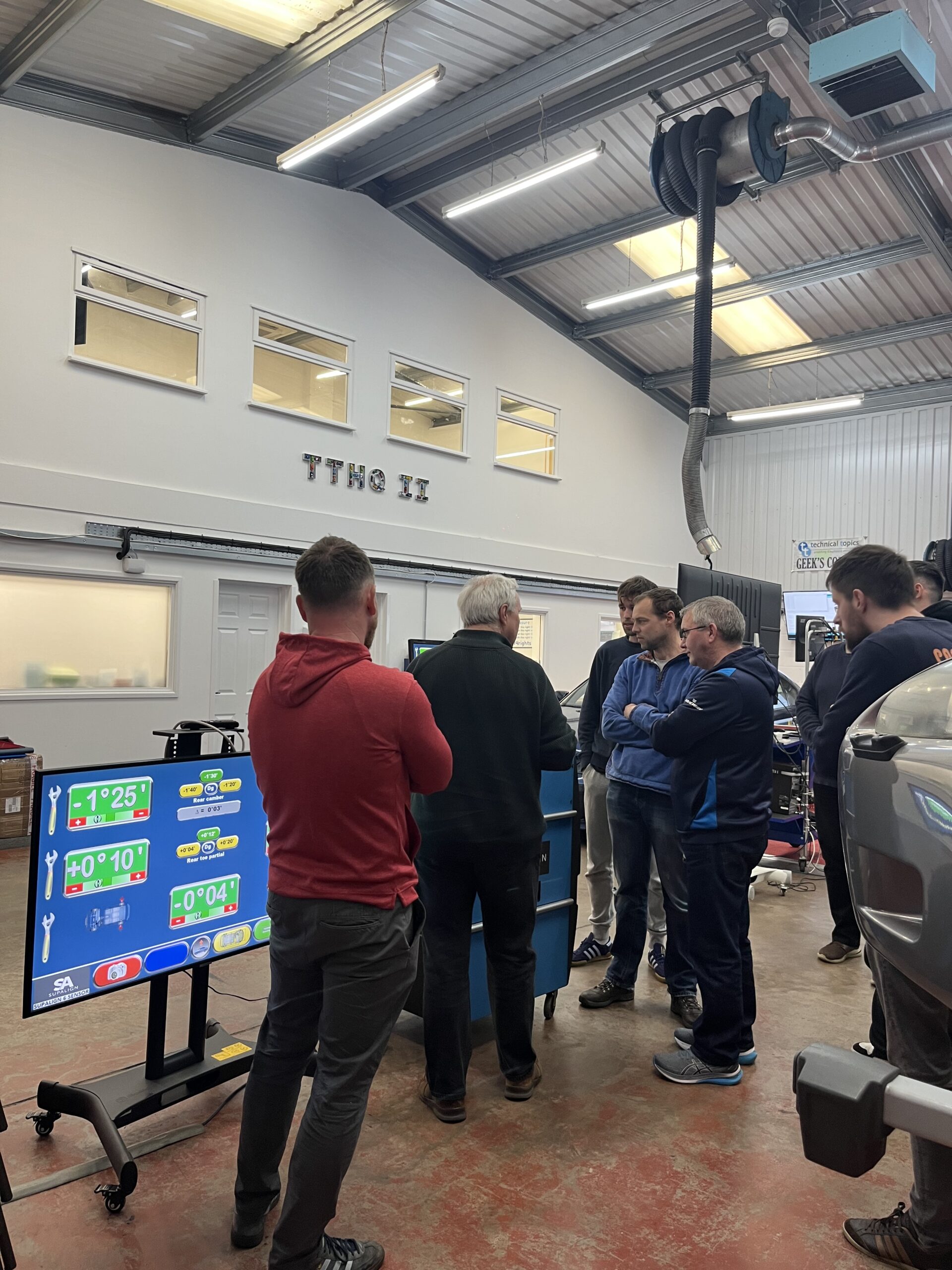Diagnostic Technician Programme 2026
Change your future for the better; become a highly qualified and highly effective technician

Programme starts
24th & 25th June
Day(s)
:
Hour(s)
:
Minute(s)
:
Second(s)
Diagnostic Skills
24th & 25th June
Electrical Diagnosis
5th & 6th August
Oscilloscope Diagnostics
16th & 17th September
Diesel Systems
28th & 29th October
Petrol Systems
9th & 10th December
Safety Systems
27th & 28th January 2027
Chassis Systems
10th & 11th March
ADAS Systems
21st & 22nd April
EV Level 3
10th & 11th June
Climate Control Systems
14th & 15th July
Introduction to Dealer Diagnostics
2nd & 3rd September
Final Assessments
14th & 15th October
Development Plan
Our Diagnostic Technician Certified Training programme offers technicians a development route to becoming a highly qualified and effective technician.
This development programme will advance your knowledge and skills and will enable you to become a highly effective Diagnostic Technician. It will enable you to solve complex and problem diagnostic jobs.
The Diagnostic Technician Programme is aimed at garages and technicians who want a defined, structured route of education with an accredited qualification outcome.
The Diagnostic Technician Programme is suited to technicians operating in the motor industry at level 3 or equivalent.
The Diagnostic Technician Programme is undertaken by many technicians as the beginning of their journey towards becoming a Master Technician.

Schedule and budget to suit you

We offer a payment plan to ensure this pinnacle training programme fits your training budget. The programme will deliver the best value for money possible.
Our expertise in the field of training for both Diagnostic and Master Technicians is unrivalled. You can be sure that your training programme is of the highest quality as it is being run by the best in the business.
The Diagnostic Technician training programme can be completed in 18 months, with courses running at 6 week intervals (choose ‘See All Programme Dates‘ for the full schedule).
The programme is structured so that you form a course programme cohort, who will all progress through the entire programme together. This enables you to form a network of like minded technicians with a common aim. You will form firm friendships and will engage in active ‘after course’ social activities with the other techs on the programme.
IMI Accreditation
Successful completion of the programme and assessment will result in the award of the accredited Diagnostic Technician Training award and your entry on to the IMI’s Professional Register.
Your professional status of Diagnostic Technician is a high level technical achievement and is recognised throughout the motor industry.
Diagnostic Technicians are revered in the industry, are seen as highly competent technicians in the workshop. Diagnostic Technicians attract good levels of pay and working conditions.
Secure the best future for yourself and your family, become a Diagnostic Technician with Technical Topics.

Modules
Module 1 - Diagnostic Skills
Accurate and efficient diagnosis is a requirement for success in the business of diagnostics. This course will ensure that you have a thorough understanding and knowledge of what is necessary to achieve a quick and accurate diagnosis.
For every vehicle problem there are best-outcome methods and an efficient approach to establish the root cause of the symptoms. This course will show the various elements that should be implemented when approaching a variety of vehicle problems so that the vehicle is fixed first time every time. You will discover which diagnostic tools and information are essential to successful diagnosis outcomes and how they should be used to execute the best diagnostic routine.
You’ll also learn how to reduce diagnostic comebacks and how to fix more cars faster.
Module 2 - Electrical Diagnosis
Technicians are required to carry out electrical testing and diagnosis on modern vehicle systems. We’ll show you foolproof techniques for quick and accurate electrical fault finding and provide you with a working knowledge and a range of ‘go-to’ test procedures which will enable you to correctly diagnose a wide range of electrical system circuit faults.
Exercises and experiments on this course will provide you with a sound foundation knowledge of auto electrical principles and fundamental test procedures using digital multi-meters, test lights, power probes and other critical test and measurement tools. You’ll be able to put these into practice as soon as you get back to work to fix more cars faster.
Module 3 - Oscilloscope Diagnostics
Gain invaluable skills in the utilisation of an oscilloscope for quick and accurate fault diagnosis.
This course is for automotive technicians who would like to be able to quickly and accurately diagnose vehicle system faults and test electrical circuits or components. Automotive oscilloscopes are being increasingly utilised for the confirmation of faults and are now an essential piece of equipment for any workshops.
The ability to test the signals passing between electronic systems and the respective actuators and sensors is a highly desirable skill-set. This course provides a solid introduction to the skills required in using a typical Automotive Oscilloscope for fault diagnosis.
Module 4 - Diesel Systems
Diesel engine management problems are a large element of the diagnostic problems seen by many technicians. This course has been designed to provide you with critical system knowledge and understanding which relates to modern diesel control systems and how to diagnose faults with them quickly and effectively.
The course builds from diesel engine principles, through essential diagnosis, including low pressure supply systems, their operation and the most appropriate tests & diagnostic procedures. We will also cover how high system fuel pressure is generated along with the different control strategies and components which are employed in the efficient running of the modern diesel vehicle.
You will learn what and how to test when faults or symptoms are present. You will also learn about the different types of fuel metering devices and how they can best be assessed as part of an efficient diagnostic routine to include sensors and actuators as well as emission control systems including high and low pressure EGR, DPF, AdBlue & SCR as well as boost control.
Module 5 - Petrol Systems
Petrol Engine drivability faults, warning light and running concerns happen frequently, however, these faults may not always be dealt with quickly and accurately. This course will change that as it will provide you with the skills and knowledge required for effective diagnosis of these systems enabling you to fix more cars faster.
The course will provide you with a sound understanding of typical engine management systems operation. We’ll delve deep into a wide variety of sensor and actuator test and measurement techniques and you’ll develop a ‘best results’ diagnosis routine using a range of diagnostic equipment, including the oscilloscope. We will delve into fuel supply systems and ignition systems as well as emission control system principles (including lambda diagnosis) and fuel trim analysis.
You will learn skills during this training course that you’ll be able to put into practice as soon as you get back to the workshop.
Module 6 - Safety Systems
ABS, ESP and SRS have been with us for many years, but can present a real challenge to quickly and accurately diagnose faults and symptoms. This course will cover a range of systems that you will face in your workshop. The course is designed to give you confidence in accurately diagnosing ABS, ESP and SRS faults.
You will learn about the form, function and operation of ABS, ESP and SRS systems, including their component parts and operational functionality across a range of different system types. You will discover the different types of hardware including various analogue, digital and intelligent sensors found within these systems.
We will be using a range of diagnostic and test equipment including oscilloscopes, meters, diagnostic scan tools and information sources which will see you return to work with a broad range of diagnostic, test and measurement skills. You will be able to put these skills to work as soon as you get back to your workshop.
Module 7 - Chassis Systems
The chassis systems module will take a more in depth look into steering, chassis and alignment.
This course will cover suspension and steering component design, along with the inspection, testing and diagnostic procedures for steering and suspension.
It will detail the purpose of vehicle alignment and alignment specifications as well as the key automotive alignment angles and their concepts resulting in knowledge why total vehicle alignment is required.
Candidates will understand and demonstrate the procedures needed to complete vehicle alignment and they will perform the correct wheel alignment procedures on a modern vehicle.
Understanding the procedures for the fitment of aftermarket alignment systems, and their correct use is core to this course.
Advanced topics and concepts such as Steering Axis Inclination, Scrub Radius, Bump Steer, and Vehicle Symmetry are covered, as well as the influence that these angles have on the handling and performance of a vehicle.
The course will also cover the issues involved when ride height is altered (such as lowered and lifted vehicles) and how to properly align lowered and lifted vehicles with relevant modified alignment specifications.
Module 8 - ADAS Systems
The self-driving vehicle is threatening to be upon us, but however long fully autonomous vehicles take to arrive, the plethora of self-driving technology is ever growing.
The systems required to facilitate self-driving are fitted to many vehicles now, and they require a subtly different approach to service, diagnosis and repair.
Understanding these systems in isolation and then being informed and equipped to deal with them as a joined-up, autonomous vehicle is the aim of this course.
ADAS, Side Assistance, Lane Assist, Brake By Wire, Steer By Wire, V2V, V2x and much more besides are covered in this session.
You will achieve the calibration level Insurance Industry Recommended ADAS Calibration Certification during this module.
We will also cover calibration equipment (both digital and analogue), the business and space requirements to offer this service, as well as understanding the business model required to prosper from this opportunity.
Module 9 - Climate Control Systems
This module provides Diagnostic Technicians with both the underpinning knowledge and the practical skills required to perform A/C and climate conditioning system service, repair and diagnosis. Top quality service and repair is about much more than just ‘whacking’ the machine on the vehicle and pressing the button. Done right, Climate Control service is a very decent profit centre for your business.
This module covers both of the common system refrigerants, R134a and R1234yf, in detail, as well as providing an introduction to R744. This module will take you through refrigerant handling procedures and safe working practises with vehicle air conditioning systems in accordance with the current legislation.
You will get in depth with the significant components involved with AC and climate control, including the construction, operation and test procedures. Key components such as compressor types (including variable displacement and high voltage), condensers, evaporators, receiver dryers, TXV valves and fixed orifice tube, control system operation, LIN bus controls (motors and control flaps), electrical and electronic diagnostic techniques as well as pressure diagnosis.
Confidence in the system’s form, function and operation will lead to a good understanding which will, in turn, lead to a high degree of proficiency in service and repair. This will enable you to turn a healthy profit on year round climate control work.
Module 10 - EV Level 3
Our Hybrid and Electric Vehicle Level 3 training course has been designed for Diagnostic Technicians who are required to diagnose, remove, refit and repair Hybrid and Electrical Vehicle components. It follows the National Occupational Standard at Level 3 and successful completion (via formal assessment) leads to a nationally recognised Level 3 qualification.
This training course will enable you to recognise, evaluate, remove and refit hybrid and electric vehicle components, as well as making the system safe. You will learn to safely use a suitable multimeter, insulation tester, the oscilloscope and a diagnostic scan tool (DTC’s and Data Stream) as well as specialist safety equipment. You will access vehicle manufacturers’ information as necessary to obtain accurate and safe repair operations.
We have teamed up with the IMI in order to have this course accredited at Level 3. One of the reasons we have done this is in anticipation of proposed health and safety legislation and/or licensing for technicians who want to work with these vehicle systems. This course meets the National Occupational Standards at Level 2 and Level 3, and is formally assessed. Successful completion of the course and the assessment will lead to the award of a Level 3 Qualification in Hybrid and Electric Vehicle.
Module 11 - Introduction to Dealer Diagnostics
Dealer Diagnostics is much more than just a scan tool. Dealer diagnostics can be thought of as the joined up solution of tools, training and information provided by the vehicle manufacturer.
As vehicle technology advances, technicians can no longer rely on the generic scan tools or aftermarket technical information. They need comprehensive information that relates to a specific VIN number. They need diagnostic equipment that can perform software updates, comprehensive component testing and enabling security related components, to complete the repair.
Technical service bulletins that show you silver bullets of what’s wrong with the car you’re working on, along with comprehensive repair manuals and circuit diagrams are how the best technicians fix more cars faster.
All of these things are contained within the vehicle manufacturers diagnostic and information systems. This module will show you just how easy it is to access and use a range of systems under the expert guidance of a Master Technician Trainer.
Module 12 - Diagnostic Technician Final Assessments
The Diagnostic Technician Assessment involves the final preparations and practical assessments.
The team at Technical Topics will have prepared you well, so much so that the assessments appear to be almost a formality. Many technicians, when questioned after the assessment event, even say that they actually enjoyed the assessments, as they were so well prepared.
You will be familiar with the level and type of task which will form the assessment, even though the actual assessment is not declared until you undergo it. You will have done several ‘preparation’ assessments during the Diagnostic Technician programme, so there will be no surprises for you regarding what will happen on the day.
Our expert trainers and assessors will ensure that there is a chilled and relaxed environment, and that the assessments are carried out in a friendly and professional manner.
You will be informed of the result on the day, and upon successful completion, you will be presented with a Diagnostic Technician achievement certificate and have a handover photograph taken. We will draw up a press release for you, which can be used to promote your achievement via the relevant media channels.
IMI Technical Register
Upon completion of the Diagnostic Technician programme and IMI accredited assessment process, you will be eligible to appear on the Professional Register. https://tide.theimi.org.uk/member-register
Need some guidance?
Taking on an 18 month course of training is a huge commitment, both personally and professionally.
We’re here and happy to discuss your training needs in order to make a plan that enables you to reach your goals and works for you entirely.
Send us an email at hello@techtopics.co.uk to arrange a call with us.
